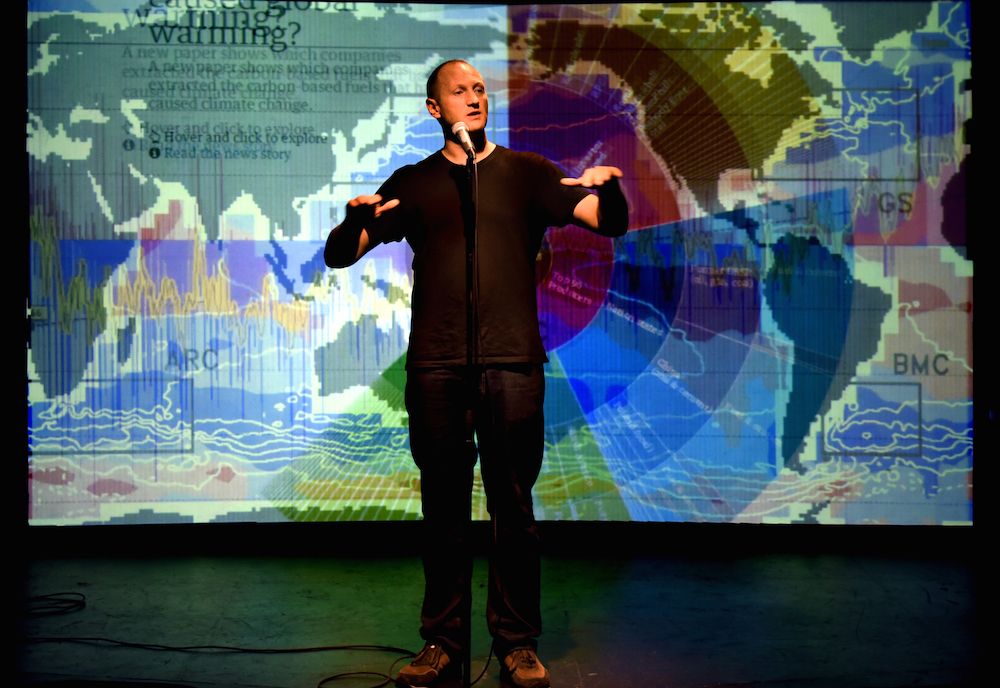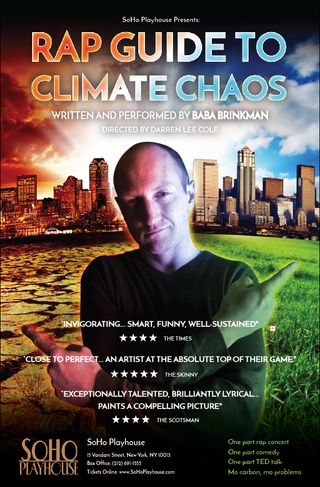'Rap Guide to Climate Chaos': Q&A with Baba Brinkman

Mo' carbon, mo' problems. Baba Brinkman — perhaps the world’s only "peer-reviewed rapper" — has written and starred in several stage shows that combine hip-hop and rap with science, like "Rap Guide to Evolution" and "Rap Guide to Human Nature."
In his newest theater performance — "Rap Guide to Climate Chaos," currently running at the SoHo Playhouse in New York City through June 11 — he tackles the heated topic of climate change. Using his unique approach, Brinkman questions how individuals and governments are coping with a changing planet and addresses some of the tough choices that we face as Earth continues to warm at an unprecedented rate.
Brinkman recently spoke with Live Science about his latest show, and the challenges of using hip-hop and rap to address climate change and other complex scientific topics. [6 Unexpected Effects of Climate Change]
(This Q&A has been edited for length and clarity.)
Live Science: What led you to rap performance in general, and were you always rapping about unconventional subjects?
Baba Brinkman: I wrote my first raps when I was 18 or 19. I was doing a comparative literature degree in Vancouver and I just started seeing a lot of parallels in hip-hop music and the poets I was studying: William Blake, John Donne, Dylan Thomas. The first raps I wrote were very hyper-literary, referencing poems and themes of classic literature. And I knew early on that as a hippie Canadian from the suburbs with a Caucasian background that I would have to be a different kind of rapper from day one.
Live Science: When did you start integrating science with rap and hip-hop?
Sign up for the Live Science daily newsletter now
Get the world’s most fascinating discoveries delivered straight to your inbox.
Brinkman: Somehow Chaucer led me to [Charles] Darwin. The main project I started with was translating "The Canterbury Tales" into rap — that became my master's thesis. When I graduated, I took my rap version of "The Canterbury Tales" on tour and happened to perform it at Birmingham University in the U.K. A biologist who was co-organizer of that event took me aside and said, "You're good at explaining Chaucer, do you think you could explain Darwin?" He had a grant from the British Council to create a Darwin Day symposium, and he said, "If you can spend the next six months getting evolutionary biology raps written, I'll hire you to come and be the entertainment at my conference."
Live Science: What were some of the big challenges in writing about science that way?
Brinkman: "The Canterbury Tales" were already a story — it was just a matter of retelling it in my own words. In "Rap Guide to Evolution," I had to find the story. I looked at different aspects of evolutionary theory and broke it down into subtopics: natural selection, artificial selection, sexual selection, group selection. Each of those became a rap told from the perspective of a persona. I found the themes of evolution that seemed to map to personas or themes in hip-hop culture, and created monologues based on those parallels. [Cloud Shields and Cow Pills: The Craziest Climate Change Fixes]

Live Science: Is that what you did for your current show?
Brinkman: I took the same approach to climate change, looking for the storytelling elements that people naturally respond to. You're trying to find the kernels that create that sense of, "I get this, I understand."
Live Science: How was writing about climate change different?
Brinkman: There's something about climate change that fails to engage our imaginations and emotions — people traditionally associate it with something that's going to happen at some point in the future, but not something you have to worry about right now. And because it's distributed in responsibility — it's an aggregate effect of billions of people going about their lives. None of us is really doing anything that we consider morally wrong — even though it adds up to something catastrophic and has moral significance, no one's at fault specifically. But by just going about our lives, we're all contributing to the problem. Most of the show ended up being about the psychology of climate change, what kind of reactions people naturally have to the bad news.
Similar to the "Rap Guide to Evolution," it's a series of personas. There's the, "We're all screwed, here comes Armageddon" view, the climate deniers' and contrarians' view, the techno-utopian look-on-the-bright-side view [the idea that innovation and technology will take care of everything].
My previous shows were more descriptive — like, "Here's what the science is about." This one is, "Here's what the science is about," and "Here's what we should do now." [5 Places Already Feeling the Effects of Climate Change]
Live Science: As you created these "climate personas," when did music become part of the process?
Brinkman: I start with an outline, how I'm going to tell the story. I sketch out the themes I want to talk about until I have 20 short chapters of about 3 to 4 minutes each. Then I go looking for music. I work with music producers who send me instrumentals — song ideas, about 2 minutes each — and I put them into audio-editing software and rebuild them until I have about 90 instrumentals: a basic drums, bass and melody combination. Then I listen.
Let's say I'm telling a story about the degree of catastrophe that's possible if our worst-case scenarios about climate change come true. I listen to the music: this one's too happy, this one's too silly, this one's too sad. Then I find one that sounds fierce: low-key harmonics, snarling, sharp drums — yeah, that's the one. And then I build the arrangement, flesh it out, and that becomes the track.
Live Science: "Rap Guide to Climate Chaos" is entertainment with a serious message. What's one "big idea" you'd like your audiences to take home with them?
Brinkman: Science is at the mercy of politics — economic development and the way we've powered our economies is what's causing the problem. A lot of greening advocates say what we need to do is buy electric cars, recycle more, put solar on our houses. And there's some value to that, but that's blatantly not going to be enough.
I tell people in the show, what you do as an individual actually doesn't matter except insofar as it influences other individuals. Private response to this is going to be guaranteed to fail, but that doesn't mean that you can't have an impact as individuals, because what you can do is influence institutions, corporations and governments — and that's where I want people to focus their efforts.
Follow Mindy Weisberger on Twitter and Google+. Follow us @livescience, Facebook & Google+. Original article on Live Science.

Mindy Weisberger is an editor at Scholastic and a former Live Science channel editor and senior writer. She has reported on general science, covering climate change, paleontology, biology and space. Mindy studied film at Columbia University; prior to Live Science she produced, wrote and directed media for the American Museum of Natural History in New York City. Her videos about dinosaurs, astrophysics, biodiversity and evolution appear in museums and science centers worldwide, earning awards such as the CINE Golden Eagle and the Communicator Award of Excellence. Her writing has also appeared in Scientific American, The Washington Post and How It Works Magazine. Her book "Rise of the Zombie Bugs: The Surprising Science of Parasitic Mind Control" will be published in spring 2025 by Johns Hopkins University Press.
Most Popular

